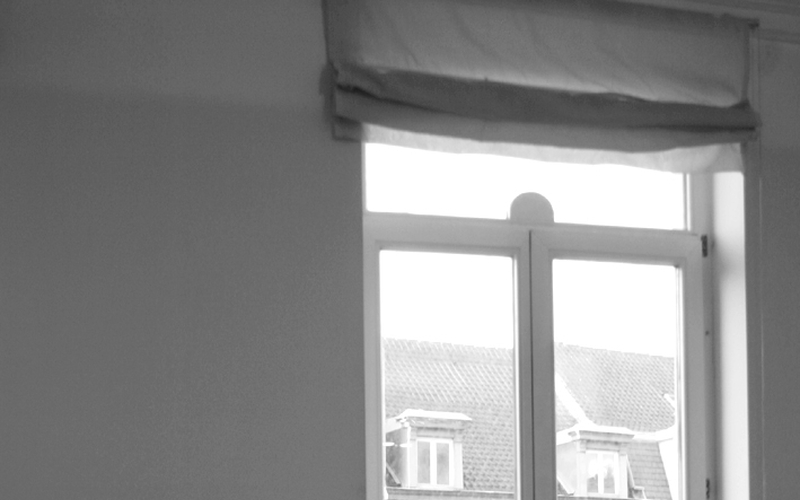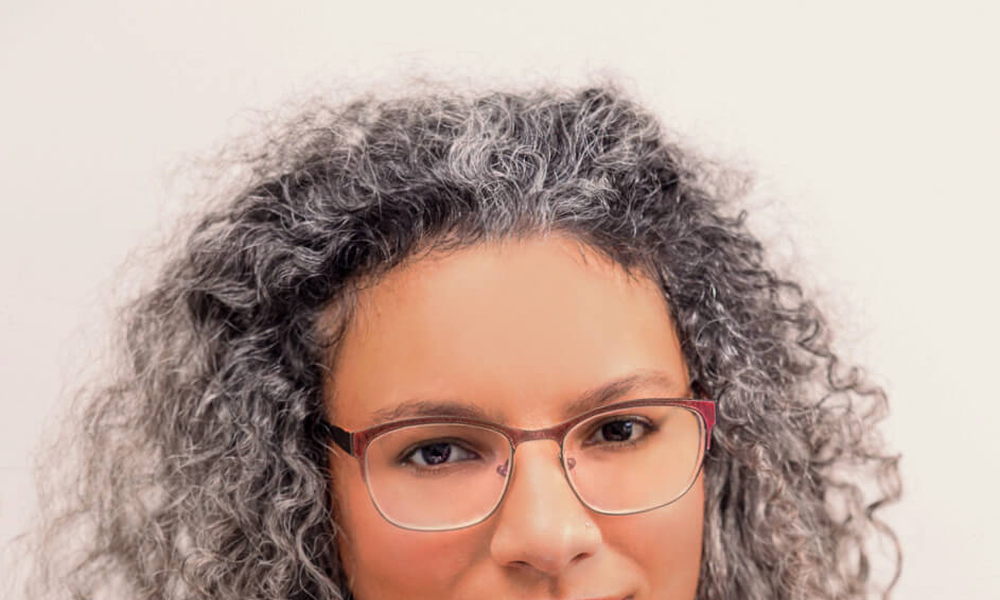Open Letter from our Writer in Residence: Dear Silver-Haired Woman on the Back Patio of the Lesbian Bar Called Mothers & Daughters

Before heading back to the United States after her residency at Passa Porta in June, poet Lauren Russell (1983) sent us the following open letter and a new poem with voice recording.
Lauren Russell is a research assistant professor and is assistant director of the Center of African American Poetry and Poetics at the University of Pittsburgh. Among her recent publications are Dream-Clung, Gone (Brookly Arts Press, 2012), a chapbook with narrative, polyphonic poems, and What's Hanging on the Hush (Ahsahta Press, 2017), a full-length book mixing “high” and “low” culture. Her next book Descent is forthcoming from Tarpaulin Sky Press.
Russell’s work often deals with concerns that range from race, gender and sexuality to loneliness, madness and grief. “With humor and slightly off-kilter introspection, her poems disrupt even their own speaking, frequently singing “I” (…) “operating in a range of modes, from tight lyrics to sprawling, fragmented texts to language experiments”. (Ashahta)
Her residency in Brussels was the result of an exchange between Passa Porta and Pittsburgh City of Asylum. This is her website.
Dear Silver-Haired Woman on the Back Patio of the Lesbian Bar Called Mothers & Daughters,
Halfway through my residency at Passa Porta, I read an essay collection by the American poet Terrance Hayes, who used to be my teacher. I turn to his work when my own feels stale or stuck, because there is a restless imagination at play in his poems (poetry is an animal, not a machine, he says in the essay collection, To Float in the Space Between), and this restlessness, this beast of line and image, helps set my own work free. In the book, Terrance mentions his own residency at Passa Porta: “Some years ago I travelled to Brussels, to a writing residency, in search of writerly solitude. To my surprise, that solitude collapsed too often into longing.”
For me, too, this has been a residency in longing. I came here thinking that my work is becoming insular, too involved in its own intimate emotional landscape. I hoped that by leaving my life in Pittsburgh behind for a month and traveling to another continent, I would be challenged to bounce that interiority off of worlds far outside it, and in the disarranged reflection make discoveries that could tip the writing forward. But I soon found that to be alone in an unfamiliar country is the ultimate interior. There is nothing more insular than stumbling around in your own mind.
I was outside of language, and, for the first week or more, outside of time — so jetlagged that I was unable to fall asleep for hours and then struggled to sleep through the night. I had never studied Dutch or French until this year, when I took one semester of elementary French in preparation for the residency. It was better than nothing but only slightly. Each time I leave my apartment, I am flummoxed by the necessity of speaking. When I manage to complete a transaction in French (buying tomatoes from a green grocer or telling an elevator operator which floor I want), I am ecstatic. The rest of the time I feel incompetent, a monolingual American bungling numbers and greetings and making people switch to English to accommodate me, in a city where so many seem to speak four languages fluently.
I wanted to escape my life in Pittsburgh also because I have been living in heartbreak — by which I mean banal quotidian heartbreak, not even the epic monumental heartbreak of surviving in this century. Last fall and winter my banal quotidian heartbreak tipped into a clinical depression, and for several months on end I did not want to be alive. The far-off Passa Porta residency stood in the future like a beacon, helping me through each agonizing moment. Even now that I’ve climbed halfway out of the tunnel, even now in Brussels celebrating this extraordinary life that poetry has given me! — even now I cannot say I feel particularly attached to living. My mind is a dangerous place to be, as I remembered the first week of my residency, bumbling around with pounding headaches and OCD and frequent attacks of anxiety that left me panicked and spinning.
Later on I found my rhythm. I sought out every introduction I had (two) for conversation off the page. I joined a gym and began to work out every day. I went to museums and learned the subway system and found my way around the city. Mostly I read alone in my apartment, gave myself writing prompts to keep my pen in motion, and worked through a number of startling poems. Though I often compare writing to breathing — it’s what makes me feel alive — sometimes it is more like hacking. The poet Gwendolyn Brooks wrote, “Art hurts. Art urges voyages—/and it is easier to stay at home.” But turmoil, like travel, offers possibilities. The first place I ventured beyond the grocery store was the Magritte Museum. Magritte’s way of crowding the canvas to produce a sense of claustrophobia and panic made me consider how I might articulate anxiety not just through repetition but also by refusing the margin, letting language overwhelm the printable page, spill over.
Before leaving Pittsburgh, I had Googled “Lesbian Bars in Brussels” and discovered Mothers & Daughters. Browsing the website, I noted the feminist marketplace scheduled for my second Saturday in town. I decided to go. You were on the back patio, sitting on the ground with your friends. I wanted to remark on our kinship as two silver-haired ladies in our thirties, but know how to say neither “silver” nor “hair.” I can say “Je m’appelle Lauren. Je suis poète,” but I have not said it in Brussels yet. It was on the patio that I caught my lie. In my notebook, I wrote, “I imagine that I would be less alone if I were competent in French and then remember how very untrue this is.”
In my twenties I used to frequent a bar in Brooklyn that was much like this, an easygoing lesbian bar with its regulars and tourists. I was often excruciatingly lonely but could only strike up conversations with strangers when intoxicated. I have never been able to understand small talk or how to navigate it. (In my imagination, Hell is an endless rotation of speed dating.) I no longer get drunk, and to some degree I have made peace with my social befuddlement, though I have also gone to considerable lengths to ameliorate it — memorizing facial expressions and training myself to sustain eye contact. Last fall when my therapist suggested that I might be on the autism spectrum, I shouldn’t have been surprised.
That evening on the patio I did not speak to you, and if I had I would not have known where to begin. “Je m’appelle Lauren. Je suis poète. All my writing speaks of longing.”
Instead, in my notebook I began to scratch out sentence fragments riddled with prepositions. The next day I made them into this poem, which I am giving you now, in place of silence:
I got stuck in the pipe between together & with : raw sewage pulses by my ears popped pressure : tomtom exhalations pounding GETUPANDGO GETUPANDGO : what if I won’t. there’s a lash in the stopped lids of loneliness : GOOUTANDGET GOOUTANDGET : the exit straddling among & between : the entrance dangling the base of within : a woman sitting cross-legged on the back-of-a-bar patio keeps glancing at me, her pink hair silvering : with her friends, she speaks a sinuous French : the grease of aghast & seen : GETUPANDGREET GETUPANDGREET : even in English, how much time do I spend staring at people’s feet? the distance between stumble & seize : pipe wheezes breakneck guttersputter : if it spits me out I’ll fold, I’ll crumble : GETUPANDLEAVE GONEUPANDOUT : stuck in the pipe between only & none : a Magritte sky, so blue and feathery, is cut out above :

